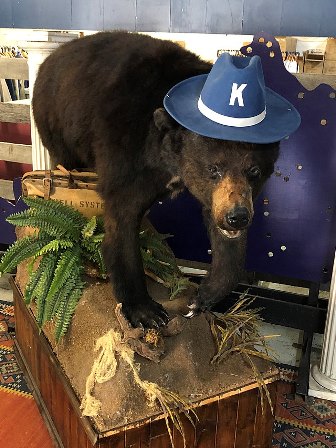Cocaine Bear is, above all, a title and a notion, which the film recognises. Elizabeth Banks’ action-comedy-thriller is partially inspired on a 1985 occurrence in which an American black bear swallowed a large quantity of cocaine and died shortly thereafter. The film concocts a fantasy scenario — or, more accurately, a collection of stories — about what could happen if a massive bear went on a ferocious, invincible, coke-fueled rampage through the Georgia woods. It also borrows from its era in terms of speed and style, not only in the old anti-drug PSAs that start the film. The mid-’80s were at the pinnacle of Spielbergian children’s adventures, but they were also at the pinnacle of a very loose and vicious age of slasher films, and Cocaine Bear bears whiffs of both. It has an ambling, gruesome insouciance that would be more off-putting in a film that wasn’t titled Cocaine Bear.
In addition, the film makes no attempt to explain itself. It begins with Matthew Rhys, who plays drug dealer Andrew Thornton (who apparently was a real person), grinning maniacally to himself (why?) while karate-kicking bundles of cocaine (why?) out of a careening, pilotless aircraft (why?). Then he fastens his parachute, puts on his sunglasses, kisses the empty cockpit, and quickly strikes his head and falls lifelessly into the skies. That’s the last time we see Matthew Rhys in this film.
By include one of the cast’s major stars in the first scene, Banks and writer Jimmy Warden subtly hint at who will survive and who will not. We presume Dee Dee (Brooklynn Prince) and Henry (Christian Convery), the two kids who skip school to ramble through the woods and paint waterfalls, are safe… Are they, however? What about Dee Dee’s exhausted nursing mom (Keri Russell), who goes in search of them? Are the two low-level hoodlums, Daveed (O’Shea Jackson Jr.) and Eddie (Alden Ehrenreich), sent by their boss (Ray Liotta) to find the missing cocaine in Georgia’s Chattahoochee National Forest? You’d assume they’d gone, but the movie spends a surprising lot of time filling in the specifics of their lives; when we first meet sad-sack widower and single-dad Eddie, he’s at a dive pub, drowning his sorrows in a plate of penne.
There are lots of other characters — Cocaine Bear’s dramatis personae verges on the Altmanian — but we’re not really here for the personalities. We’re here for the bear and the cocaine, and the movie doesn’t disappoint. The beast is initially shown stalking and destroying a hiking tourist pair before being distracted by a butterfly. Then it’s one horrific scuffle and severed limb after another, typically with someone picking up or waving about a loose block of cocaine and the bear emerging seemingly magically. If you’re looking for a realistic representation of the consequences of cocaine, you’ve come to the wrong theatre. Maybe if Cocaine Bear had been filmed in 1985, the filmmakers would have done more study on the matter. Yet, because this is a 2023 film, cocaine is still another superpower.
The film’s best set piece features a slapstick pursuit with a stretcher, an ambulance with its rear doors open, a gun, and a running emergency-aid worker, and it’s fair to say that Cocaine Bear could have used more of them. Yet there’s also comedic joy in variance. The bear may creep up on our protagonists like a threatening forest predator. It may be really lively at times. It sometimes falls on them and causes them to pass out. The writing for Warden isn’t extremely complex, yet it’s surprisingly quotable. (“You are secure. Bears are incapable of climbing trees.” “Of course!” “So, what brings you here?”) Also, the film is extremely atmospheric. It travels about aimlessly, like the people, yet at the end you feel like you’ve gone someplace.
Banks and company seem to have gone out on purpose to create a cult film. That’s typically a bad idea. Cult movies develop over time; they do not begin as such. They must first fail before being recovered by us by chance discovery, ideally by putting in a dusty VHS tape or turning on a late programme. Yet we live in a fast-paced, echo-chamber world. VHS is a thing of the past, as is late night television and, maybe, the very idea of discovery. Today, you have to declare your cult straight away. To that aim, Cocaine Bear performs well. It wouldn’t be able to call itself Cocaine Bear if it were any better.
More in Entertainment: https://buzzing.today/entertainment/
Photo Credits: https://commons.wikimedia.org/
